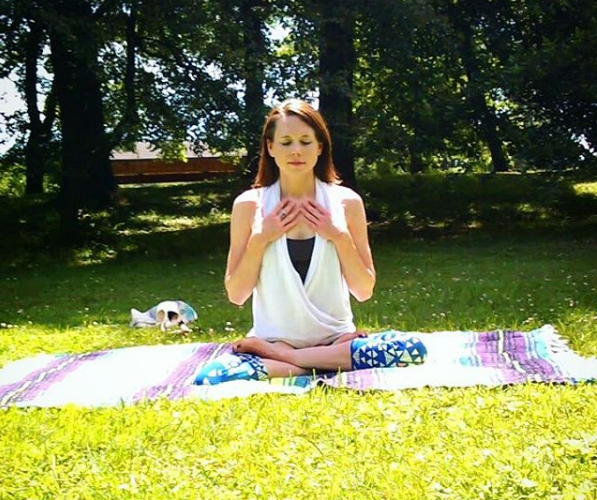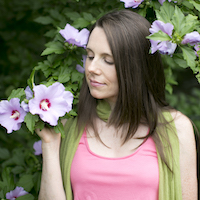Warning: a wee bit of adult language below!
I reached my breaking point sometime late last fall.
I’m not sure what triggered it, but I know it came from that deep, dark raw place that has no boundaries or personal identity.
That place that broke me free felt like a primordial scream amplified.
My inner gong was struck and the bellow carried me through months of layer-shedding.
It didn’t just come as a single “Aha!” moment; instead, I had moments upon moments of both “Fuck yes!” and “Fuck that!” There were many of F-words in my primordial scream-filled consciousness—but that F stood for freedom more than it did anything else.
What it came down to was this: I’m sick of half-assed happiness. I’m sick of feeling “too sensitive” and “too compassionate” and “too overwhelmed.”
That sick of feeling was a grand realization of: I’m okay!
The rage-filled and raw primordial scream was just what I needed to burn off the steam of “I’m not enough” that had been fueling my life up to this point.
As highly sensitive people and empaths, we are often criticized for being overly-sensitive, dramatic, or even hyper-aware in a way that makes others feel uncomfortable in our presence (or us feel uncomfortable in theirs, since we pick-up all their “stuff”). My recent journey has led me to a place of simple acceptance. In this acceptance of my giving, feeling, loving and connecting nature, that half-assed happiness (which was reined in by inner harshness), has given way to full-on contentment. I’m going to be honest, this contentment is not a permanent state—and for that I am glad. I am not trying to be a robot, here—I am a human being, and am grateful for this broad array of emotional highs and lows as they make my life so much the richer. As an empath and HSP, I most likely feel those ebbs and flows a bit more than 80 percent of the population!
I still question myself daily. I question my heart’s desires. I question my hurts and my highs. I struggle with my lows, with just accepting the “low” feelings, which is something that most of us don’t learn in school, or even from our families.
Human beings are distinct from other species for their ability to analyze feelings. Feelings are something baby boomers like my parents were not raised to talk about or process so much. Gen Xer’s (like me!) are starting to not only talk about them, but raise their kids to be okay expressing them.
It’s challenging for empaths to go through life avoiding the heart. We feel so much that the world feels like a haunted house at times—and not the silly kind. I’m not alone in my plight. I have started to run monthly workshops at a local yoga studio, called “Nurturing your Highly Sensitive and Empathic Self.” I offer mindfulness tools, group and partner communication exercises, writing prompts and meditation to get you to go deep and get down and dirty with your true nature.
These groups are helping to build community. Every student who has entered has left saying, “I’m not alone. There are others out there just like me!”
I started the workshops for myself, based on a desire that arose in the middle of a lot of inner work during one of my daily nature walks this winter—which is a way I take care of me daily—and just let my mind and heart let go after a lot of people interaction or before transitioning from my work life to my personal life. I was pleasantly surprised to see these workshops sell out. I was inspired by the need out there for what I hold so near and dear.
Essentially, I was offering my soul and it was being received!
What these workshops have hounded in more than anything else is the HSP/Empath need for community. We humans are social creatures. I think I struggled with this all of my life, because being social felt so overwhelming for me. Being social meant lots of scattered energy. It meant I’d be battling with other peoples desires and feelings and may quickly get drained by the dysfunctional social dynamics. Group conversations have been an exceptional drain on me. People talking over each other, not finishing sentences and then getting distracted when someone new walks into the conversation was one of my biggest frustrations. It was actually kind of hellish to go to a random cocktail party and experience why many found it so enjoyable.
But the group work I’ve been facilitating has actually been super helpful to me. I can go out with a group of friends and stay in my center now. I actually get energized— or at least keep my energy— when in social settings. I do this because of the tool kit I’m building. I’ve also started one to one coaching, where I can go deeper with empaths and HSPs on tools. This has been giving me more insight into myself and expanding my awareness of Self and other.
I want to share some of these tools with you! If you’re not sure if you’re an empath or HSP, check out the tools and see if they resonate. Judith Orloff and Dr. Elaine Aron, have some great work on the topic. Aron’s website even has a test you can take to find out for sure. However, I usually tell students coming to my workshops, if you are here, you are one or both of these types! Curiosity is your subconscious mind talking to you. Listen to it!
An HSP/empath “Stay in Your Center” Tool Kit:
1. Listen to your Body.
When I experience discomfort or drain, my body is the first thing to talk to me. My stomach may feel funny, my head may throb, my throat might get a lump, or my chest may burn. Years of practicing and teaching yoga has taught me that my body is intelligent. For us HSPs and empaths, it is our best guide. So when my body is getting off-balance, I stop, breathe, and might remove myself from a situation to check-in with it. A little self-care time is in order. Honor that need, even if it means cutting an outing short or changing your plans. And who knows, it may even take you on a magical outdoor walk to see the sunset that you wouldn’t have experienced had you ignored its guidance.
2. Speak and Listen with Detachment.
In my recent workshop on relationships, we practiced active listening. In active listening, the speaker shares something. The listener doesn’t speak until they are done. Before the listener responds, they speak back to their partner what they heard them say. The partner then responds, “Yes, that’s it” or “No.” and then they re-state their expression again.
The group found out that active listening is hard! The listeners found it challenging to remember everything, because as sensitive people, they started to feel the speaker’s words. In some cases, the speaker triggered an old memory or feeling for the listener, which sent their mind off in another direction. So the key to really listening instead of just feeling is to honor the separation of this person. We may think that seeing this person as separate is not compassionate. For empaths, that sense of oneness with everyone can be so overwhelming that we don’t know our own arm from their arm at times!
So we need to bear with the discomfort and honor the unique human being speaking to you is not you. After they speak, it may be helpful to say: “Thank you for sharing your heart.” Pronoun usage is important: yours and mine; theirs and mine. When my class did a detached eye gazing meditation, where I didn’t let them introduce each other, to keep it even more impersonal. After this, they tried active listening again, it was easier for them to do.
3. Get into your Heart with Appreciation and Gratitude.
One way I stay in my center before going out to unstructured social functions now is self-care. Before I go anywhere, I do something that makes my inner heart bells ring and sends a zing up and down my spine. I create a space of joy. I might blast music that makes me want to dance and sing. I make a delicious snack. I paint my toenails. I get dressed like a goddess—meaning I think I look beautiful, because if I am feeling gorgeous and radiant, then I am sending that vibe out wherever I go.
What makes you zing inside and out? It might even be a mellow meditation, a nature walk, hanging with your pet—the list goes on.
Once we start to radiate, we appreciate more. The world seems like it’s on fire with beauty. When I get myself in a joyful space, I can’t help but feel thankful for the people I’m with and my surroundings. My own thoughts bump up to a higher vibration, and everything just looks and feels more vibrant.
So those are a few tricks to help you embrace your fabulous empathic and highly sensitive selves. Remember, your nature is a gift—most of us haven’t been taught how to use this gift. We are here to learn. And what I continue to understand is that the learning does not just happen alone in a quiet room.
We learn from each other.
I’d love to hear your comments about anything that inspired you from this piece or any ways you nurture your sensitive nature that may help other readers and even myself! It takes a village! And what an amazing village we have on this planet.
Author: Sarah Lamb
Image: via the author
Editor: Renée Picard











Read 8 comments and reply